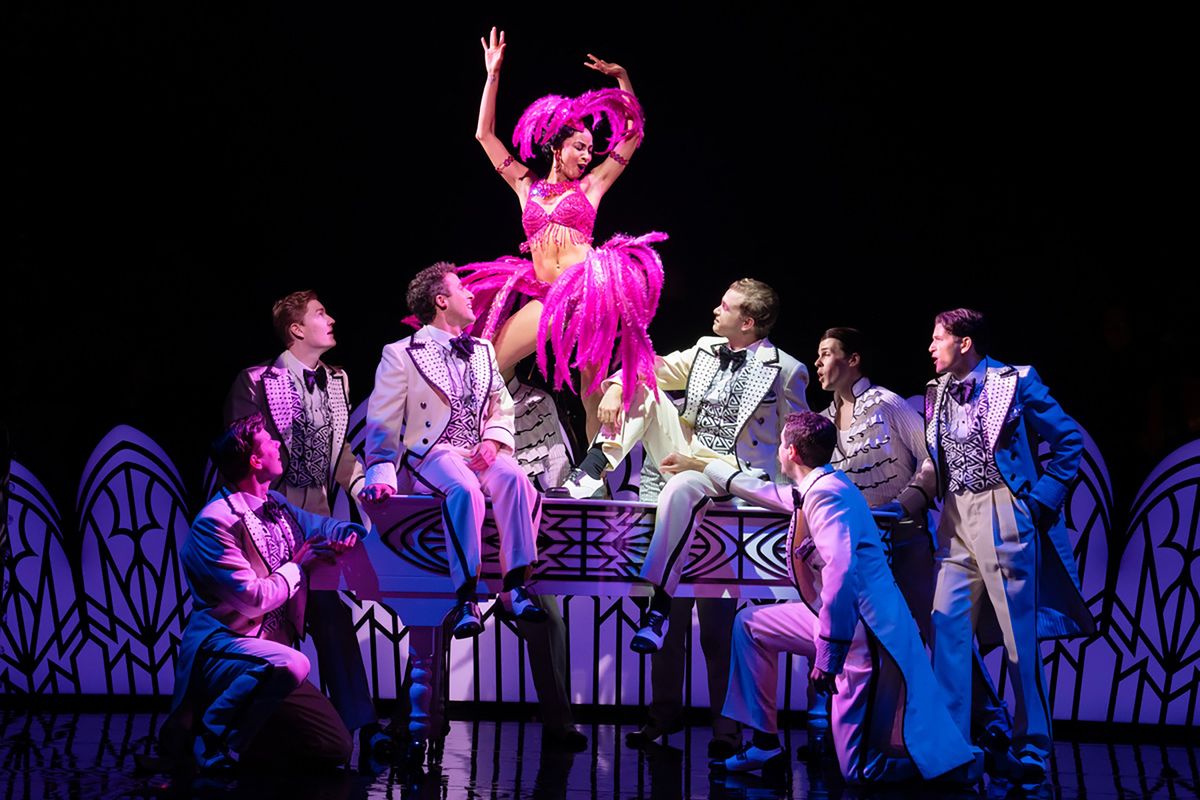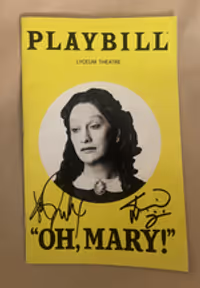HARMONY On Broadway - Opening Night Reviews
#1HARMONY On Broadway - Opening Night Reviews
Posted: 11/13/23 at 9:26am
Direct from its sold-out, award-winning downtown run, Harmony, the New York Times Critic’s Pick is now on Broadway.
Berlin, 1927.
Six remarkably talented young men form a singing group who become international sensations: The Comedian Harmonists. They sell millions of records, star in major motion pictures, and play the biggest theaters around the world. By 1935, they were never heard from again. What happened? That’s the extraordinary true story of HARMONY.
Featuring an original score by Tony®, Grammy® and Emmy® Award winner Barry Manilow with lyrics and book by long-time collaborator and Drama Desk Award winner Bruce Sussman, HARMONY has been hailed by The New York Times as a Critic’s Pick and “impossible to forget.”
Directed and choreographed by Tony Award winner Warren Carlyle (The Music Man, Hello Dolly!), this timely and captivating rags-to-riches story lost to history comes to dazzling life with a sensational cast of Broadway favorites, including Sierra Boggess (Phantom of the Opera), Julie Benko (Funny Girl), and Chip Zien (Into the Woods).
Harmony is based in part on The Comedian Harmonist Archive as curated by the late Dr. Peter Czada.
The show opens at the Ethel Barrymore Theatre on Monday, November 13.
#2HARMONY On Broadway - Opening Night Reviews
Posted: 11/13/23 at 6:48pm
Any reviews?
#3HARMONY On Broadway - Opening Night Reviews
Posted: 11/13/23 at 6:50pm
I think someone said they’re embargoed until 11pm?
#4HARMONY On Broadway - Opening Night Reviews
Posted: 11/13/23 at 8:32pm
Adam Feldman, from Time Out, said he's posting it at 10 p.m., so that's probably when the embargo lifts, although some usually pop up early.
#5HARMONY On Broadway - Opening Night Reviews
Posted: 11/13/23 at 9:00pm
Barry Manilow’s ‘Harmony’ on Broadway is no jukebox musical
https://www.spokesman.com/stories/2023/nov/13/barry-manilows-harmony-on-broadway-is-no-jukebox-m/
#6HARMONY On Broadway - Opening Night Reviews
Posted: 11/13/23 at 9:27pm
Robbie2 said: "Barry Manilow’s ‘Harmony’ on Broadway is no jukebox musical
https://www.spokesman.com/stories/2023/nov/13/barry-manilows-harmony-on-broadway-is-no-jukebox-m/
"
This really wasn’t a review so much as compilation of information that’s already been discussed in interviews.
I have a feeling this is going to be another polarizing show. I hated it and my friend (on another night) walked out at intermission, but then some are raving so who knows?
#7HARMONY On Broadway - Opening Night Reviews
Posted: 11/13/23 at 9:58pm
Review: Barry Manilow Writes the Songs That Make ‘Harmony’ Sing The story of the Comedian Harmonists—the German (and Jewish) singing sensations forced to break up due to the Third Reich—is told in this amiable if derivative musical.
https://observer.com/2023/11/review-barry-manilow-writes-the-songs-that-make-harmony-sing/
#8HARMONY On Broadway - Opening Night Reviews
Posted: 11/13/23 at 10:00pm
Review | Manilow’s ‘Harmony’ has much to admire despite weak score
https://www.amny.com/entertainment/review-manilow-harmony/
#9HARMONY On Broadway - Opening Night Reviews
Posted: 11/13/23 at 10:06pm
3/5 stars from Time Out:
https://www.timeout.com/newyork/theater/harmony-review-broadway-musical-barry-manilow
#10HARMONY On Broadway - Opening Night Reviews
Posted: 11/13/23 at 10:34pm
2 Stars
Harmony review – Barry Manilow’s Broadway musical lacks magic Ethel Barrymore Theatre, New York The period musical about a German singing group stumbles to the big stage after a troubled decades-long journey, arriving a little worse for wear
https://www.theguardian.com/stage/2023/nov/13/harmony-broadway-musical-barry-manilow
#11HARMONY On Broadway - Opening Night Reviews
Posted: 11/13/23 at 11:19pm
Why is that stupid critic comparing this show to A Beautiful Noise? This is not a jukebox musical.
MemorableUserName
Broadway Legend Joined: 3/27/19
#12HARMONY On Broadway - Opening Night Reviews
Posted: 11/13/23 at 11:30pm
NYT: Jesse Green doesn't have much positive to say other than Manilow's "often skillful, surprisingly theatrical score."
‘Harmony’ Review: Barry Manilow Writes the (Broadway) Songs
The pop star of the 1970s and ’80s crosses over to musical theater with a dark story about pop stars of the 1920s and ’30s.
https://www.nytimes.com/2023/11/13/theater/harmony-review-barry-manilow.html
"But the version of “Harmony” that opened on Monday at the Ethel Barrymore Theater, after a potholed, decades-long trek to Broadway, makes a beeline for the bleakest parts of the tale and then bleakens them further. Sussman’s script, relentlessly focused on historical trauma, takes reasonable dramatic license with the group’s actual history, but only in one direction: darker. And though Warren Carlyle’s production is smart and slick, it traps the tale in a figurative and literal glassy black box (by Beowulf Boritt) from which only pathos escapes."
"Wherever it can — in the plot, in the characterizations and in the sometimes bombastic orchestrations for a heavily synthed and amped orchestra of nine — “Harmony” wields a truncheon instead of the needle it needs. It might have helped if the supposedly comic numbers were actually funny, but neither Manilow and Sussman nor Carlyle excel at that here. The lighthearted charm song (“Your Son Is Becoming a Singer” ), the slapstick centerpiece (“How Can I Serve You, Madame?” ) and the second-act opener (“We’re Goin’ Loco!” — which features the Harmonists and Josephine Baker in a “Copacabana”-like samba) are all manic duds."
MemorableUserName
Broadway Legend Joined: 3/27/19
#13HARMONY On Broadway - Opening Night Reviews
Posted: 11/13/23 at 11:33pm
NY Stage Review:
Harmony: A Harmonious New Musical About Discordant 1930s Germany
By David Finkle
★★★★★ Barry Manilow and Bruce Susskind create, Warren Carlyle choreograph-directs, and Chip Zien finally gets his leading-man moment
https://nystagereview.com/2023/11/13/harmony-a-harmonious-new-musical-about-discordant-1930s-germany/
Harmony: Superb Singing Marks Barry Manilow’s Long-Delayed Broadway Debut as Composer
By Sandy MacDonald
★★★★☆ A singing sextet in pre-WWII Berlin wows the cabaret crowd — but proves powerless against the Gestapo
https://nystagereview.com/2023/11/13/harmony-superb-singing-marks-barry-manilows-long-delayed-broadway-debut-as-composer/
MemorableUserName
Broadway Legend Joined: 3/27/19
#14HARMONY On Broadway - Opening Night Reviews
Posted: 11/13/23 at 11:35pm
Theatrely is mixed:
https://www.theatrely.com/post/harmony-finally-on-broadway-review
"For all these issues, the last section of Harmony still packs a punch. The focus turns back to the older Rabbi, as he reckons with crushing guilt and the burden of memory. A devastating 11 o’clock number, “Threnody,” starts as Rabbi’s personal lament but grows into an elegy for all that was lost – every life, every story, all the hope and beauty snuffed out by unimaginable hatred. Zien embodies, in this number, a pain beyond description, and it is wrenching. How could it not be? Yet the searching depth of this finale cannot make up for a broadly unfulfilling work."
MemorableUserName
Broadway Legend Joined: 3/27/19
#15HARMONY On Broadway - Opening Night Reviews
Posted: 11/13/23 at 11:36pm
Deadline is mostly positive:
https://deadline.com/2023/11/harmony-danny-and-the-deep-blue-sea-reviews-1235600743/
"Manilow and his longtime writing partner and collaborator Bruce Sussman have set out to answer that very question, and Harmony accomplishes that goal handily. As a musical, Harmony occasionally soars, occasionally stumbles, but the former more often than the latter. With a structure that takes fewer chances than one might hope, Harmony is nonetheless steadily compelling and not infrequently stirring, attributes that speak as much to the Manilow-Sussman craftsmanship as to an intriguing tale long-lost to history."
MemorableUserName
Broadway Legend Joined: 3/27/19
#16HARMONY On Broadway - Opening Night Reviews
Posted: 11/13/23 at 11:39pm
The Wrap is mixed:
https://www.thewrap.com/harmony-broadway-review-barry-manilow-delivers-his-cabaret/
"“Harmony” ultimately packs a punch because the history of that period continues to shock no matter how many times this story is told.
What remains open to question, under Warren Carlyle’s splashy direction, is the appeal of the real Comedian Harmonists. An advertisement outside the Barrymore Theatre claims that the group was as “popular as the Beatles,” but their memory was erased by the Nazis — until now.
“Harmony” doesn’t always serve that memory well. In one number, “How Can I Serve You, Madame,” the sextet is dressed up as waiters but, for some reason, forgot to put on their trousers. They then proceed to serve a couple while essentially waterboarding the male diner. His female companion looks on, not in horror but with a delighted amusement at her date being senselessly doused."
MemorableUserName
Broadway Legend Joined: 3/27/19
#17HARMONY On Broadway - Opening Night Reviews
Posted: 11/13/23 at 11:40pm
Daily Beast is negative:
Review: Barry Manilow’s ‘Harmony’ Strikes a Bum Note on Broadway
Manilow and Bruce Sussman’s musical, “Harmony,” tells the mostly unknown history of The Comedian Harmonists in Nazi-era Germany. But it’s a muddled, unilluminating history lesson.
https://www.thedailybeast.com/review-barry-manilows-harmony-strikes-a-bum-note-on-broadway
#18HARMONY On Broadway - Opening Night Reviews
Posted: 11/13/23 at 11:42pm
This line from Jesse Green feels like the thesis of the show. Whether you find that tactic successful or not, this is the show:
the prominence of [Chip Zien's narrator] character turns “Harmony” into a passive show about memory at the expense of the actual action.
Green and I are almost on the exact same page with complaints about the show. There's good material there, underserved by barely-sketched-out characters, synth-heavy orchestrations, a black void of a set design, some heavy-handed manipulation from the authors, and a story that just might have been more interesting as a documentary. Good to see some praise for Boggess, the Marionette number, and the finale.
I initially thought maybe this could have a run along the lines of Some Like It Hot. After the reviews and the preview grosses, maybe Almost Famous is a more apt comparison?
MemorableUserName
Broadway Legend Joined: 3/27/19
#19HARMONY On Broadway - Opening Night Reviews
Posted: 11/13/23 at 11:49pm
B- from Entertainment Weekly
Harmony review: Barry Manilow's moving musical doesn't truly sing until its second act
https://ew.com/theater/theater-reviews/harmony-review-broadway-barry-manilow-musical/
Jarethan
Broadway Legend Joined: 2/10/11
#20HARMONY On Broadway - Opening Night Reviews
Posted: 11/13/23 at 11:51pm
The reviews are a lot better than I expected. I suspect it will give hope to the producers, who will waste a lot of $$ in hopes that it will catch on. I am really surprised that Green said good things about the score, which I thought was lousy.
MemorableUserName
Broadway Legend Joined: 3/27/19
#21HARMONY On Broadway - Opening Night Reviews
Posted: 11/13/23 at 11:54pm
Vulture is mixed.
https://www.vulture.com/2023/11/theater-review-harmony-broadway-barry-manilow.html
"By Act Two, that sensibility runs up against the increasingly grim history, and the results are intriguing but not so successful. Sussman and Manilow hit at the situation but never quite get their heads around it. The Harmonists, strong-armed into acting as cultural ambassadors by the Nazis, rebel by performing a satire of nationalism on tour in Copenhagen, a number called “Come to the Fatherland,” where they dance in lederhosen while strung up to the ceiling like Marionettes. The parody is about as obvious as the dialogue that proceeds it when the young Rabbi announces, “They want ambassadors? Let’s give ’em ambassadors.” And, like so much of Harmony, it can’t help reminding you of the sharper, darker work that Kander and Ebb pulled off at the Kit Kat Club. The same goes for the show’s female secondary figures, a gentile who marries Rabbi (Sierra Boggess) and a fiery Jewish Bolshevik activist (Julie Benko, fresh from Funny Girl). Both are roughly drafted characters, in the vein of any number of archetypes evoking the Weimar era, though both actresses have powerful voices and share a moving, if unnecessary, duet."
MemorableUserName
Broadway Legend Joined: 3/27/19
#22HARMONY On Broadway - Opening Night Reviews
Posted: 11/13/23 at 11:58pm
NY Daily News/Chicago Tribune is mostly positive.
BROADWAY REVIEW: Barry Manilow’s true-life ‘Harmony,’ about singing group destroyed by Nazis, is an emotionally charged experience
https://www.nydailynews.com/2023/11/13/broadway-review-barry-manilows-true-life-harmony-about-singing-group-destroyed-by-nazis-is-an-emotionally-charged-experience/
#23HARMONY On Broadway - Opening Night Reviews
Posted: 11/13/23 at 11:59pm
Jarethan said: "The reviews are a lot better than I expected. I suspect it will give hope to the producers, who will waste a lot of $$ in hopes that it will catch on. I am really surprised that Green said good things about the score, which I thought was lousy."
It shouldn't give them that much hope. The Off-Broadway run was reviewed much more favorably in the NYT, by Elisabeth Vincentelli. There are quotes they can TRY to use to spin ("gorgeous, skillful and theatrical" -NYT) but it may be too little, too late.
This show has had some of the best press coverage of the season so far, with Manilow front and center everywhere. The fact that that hasn't translated into sales yet is telling. The average ticket was just $83 for week ending 11/5.
pmensky
Broadway Star Joined: 7/18/11
#24HARMONY On Broadway - Opening Night Reviews
Posted: 11/14/23 at 12:01am
Can this show survive the holidays with reviews like this? Mixed reviews aside, do they think tourists seeking holiday cheer will ignore the subject matter and buy tickets just because Manilow composed it?
MemorableUserName
Broadway Legend Joined: 3/27/19
#25HARMONY On Broadway - Opening Night Reviews
Posted: 11/14/23 at 12:02am
Theatremania is mixed-to-positive:
https://www.theatermania.com/news/review-music-and-passion-and-bourgeoning-fascism-in-barry-manilows-harmony_1720947/
"Whether or not Harmony will find harmony in the bright lights of Times Square is anyone’s guess in a precarious theatrical landscape where better shows have come and gone in a New York minute, but if nothing else, amid a precipitous worldwide rise in antisemitism, the time is certainly, and unfortunately, right for it. This is a show that my grandparents would have raved about during the post-services Kiddush luncheon: undeniably moving and extremely powerful, the pros of Harmony generally outweigh the cons. It’s not as profound as everyone involved clearly thinks it is, but it’ll give you the good cathartic cry you’ve been waiting for."
Videos







